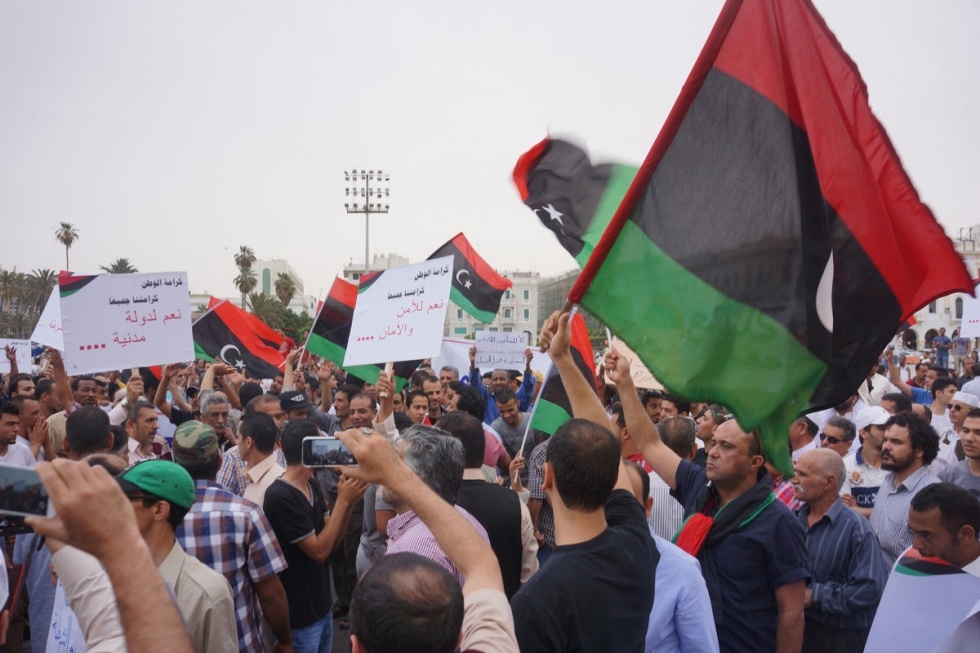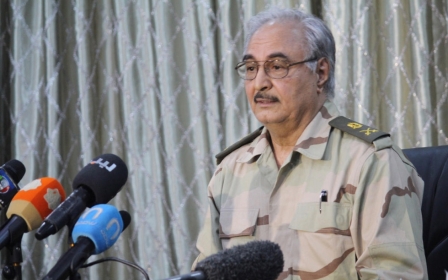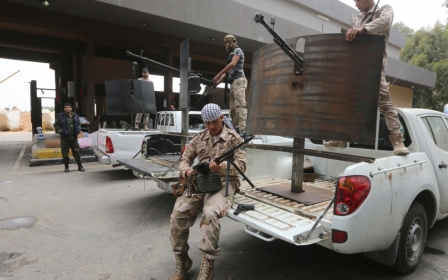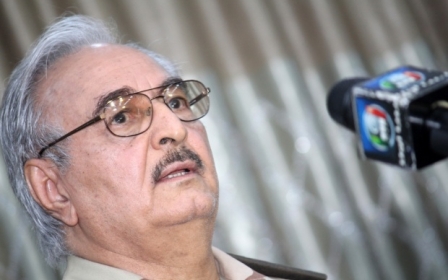Libya's Haftar rejects new prime minister

Renegade general Khalifa Haftar and other allied leaders will not recognize new prime minister Ahmed Maiteeq or his government, a Haftar spokesman said Monday.
"The group also rejects any initiatives by Libya’s General National Congress [parliament] to reach a middle ground on Maiteeq's expected government," Col. Mohamed Hegazi told Anadolu Agency.
Haftar argues that parliament's legislative mandate should be transferred to the country's constitution-writing body.
The Libyan General National Congress voted to give confidence to Maiteeq, a businessman in his early 40s, last week.
A few days ago, Haftar called on Libya’s Supreme Judiciary Council to form a civil body to govern the country in coming months and oversee upcoming parliamentary polls.
New MEE newsletter: Jerusalem Dispatch
Sign up to get the latest insights and analysis on Israel-Palestine, alongside Turkey Unpacked and other MEE newsletters
In a televised address on Wednesday, Haftar said the judicial body would delegate power to the new assembly while Libya’s Supreme Council of the Armed Forces would continue to protect the country during the political transition.
Meanwhile, Algerian Foreign Minister Ramtae Lamamra said Monday that his country was not ready to coordinate with Haftar, whose forces have been battling militias incorporated into Libya’s regular army.
"Algeria is not ready to coordinate with" the general, Lamamra told reporters on the sidelines of a ministerial meeting of the Non-Aligned Movement.
"This is an internal issue. Algeria will not change its policy of non-interference in the affairs of brotherly and friendly countries," he said.
Addressing the Libyan people on television several times in the past week, Haftar has said that he would attempt to obtain Algerian support for his ongoing campaign.
Lamamra reiterated his country's "solidarity with the Libyan people."
At the same time, a group of militias in the eastern Libyan city of Benghazi slammed a military offensive launched in their city by Haftar.
In a statement, the "Revolutionaries of Benghazi" – made up of militiamen absorbed into the army following the downfall of the Moamer Gaddafi regime in 2011 – accused renegade general Haftar of trying to "usurp" power in Libya regardless of the "human cost of his ambition."
"We reject the strife Haftar wants to sow in this country," the statement said.
Earlier this month, forces loyal to Haftar took up arms against militias serving as part of Libya’s regular army.
Haftar says his campaign, dubbed "Operation Dignity," is aimed at "purging" Libya of "extremists."
Libya’s government, however, has called the move a "coup" against constitutional legitimacy.
While, internal division in Libya continues, Turkey’s foreign ministry advised against non-essential travel to Libya and Nigeria as the security situation in both countries remains unpredictable.
A statement released on the ministry's website on Monday recommended that Turkish citizens avoid travel to Benghazi and Tripoli due to increasingly intense armed clashes since last week.
The ministry also warned of the risks of travel to Nigeria’s Adamawa, Borno and Yobe states due to the recent kidnapping events and terrorist actions in the country.
In Benghazi at least two people were killed when missiles were fired at a Libyan special forces army, according to military sources.
Middle East Eye delivers independent and unrivalled coverage and analysis of the Middle East, North Africa and beyond. To learn more about republishing this content and the associated fees, please fill out this form. More about MEE can be found here.




